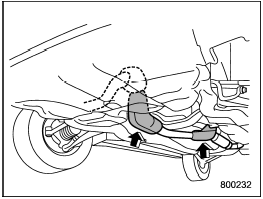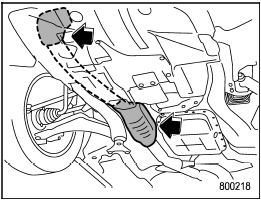Catalytic converter

Turbo models

Non-turbo models
The catalytic converter is installed in the exhaust system. It serves as a catalyst to reduce HC, CO and NOx in exhaust gases, thus providing cleaner exhaust.
To avoid damage to the catalytic converter:
- Use only unleaded fuel. Even a small
amount of leaded fuel will damage the
catalytic converter.
- Never start the engine by pushing or pulling the vehicle.
- Avoid racing the engine.
- Never turn off the ignition switch while the vehicle is moving.
- Keep your engine tuned-up. If you feel the engine running rough (misfiring, backfiring or incomplete combustion), have your vehicle checked and repaired by an authorized SUBARU dealer.
- Do not apply undercoating or rust prevention treatment to the heat shield of catalytic converter and the exhaust system.
- Do not drive with an extremely low fuel level.

- Avoid fire hazards. Do not drive or park the vehicle anywhere near flammable materials (e.g., grass, paper, rags or leaves), because the catalytic converter operates at very high temperatures.
- Keep everyone and flammable materials away from the exhaust pipe while the engine is running.
The exhaust gas is very hot.
See also:
Tire pressures
WARNING
Driving at high speeds with excessively low tire pressures can cause the tires
to deform severely and to rapidly become hot. A sharp increase in temperature could
cause tread separation, ...
Child safety
WARNING
● Never hold a child on your lap or in your arms while the vehicle is moving.
The passenger cannot protect the child from injury in a collision, because the child
will be caught bet ...
Adverse safety consequences of under-inflation
Driving at high speeds with excessively
low tire pressures can cause
the tires to flex severely and to
rapidly become hot. A sharp in-
crease in temperature could cause
tread separation, and ...


